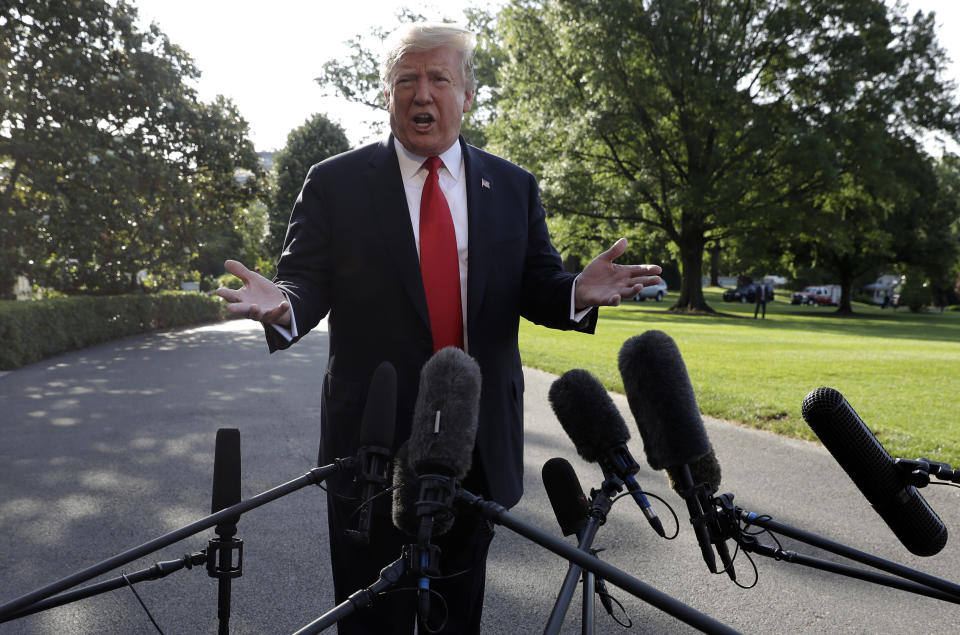Trump has no choice but to land a trade deal with China
President Trump is playing hard to get in his trade negotiations with China, raising the stakes with new tariffs and pretending to be unperturbed by the consequences. But Trump will have to settle this dispute if he wants a serious shot at reelection—even if it means caving—and get it done by the end of summer.
Trump thinks he has the upper hand with China because the U.S. economy looks strong and he believes his trade war hurts China more than America. But that’s backward-looking. The U.S. economy is probably getting weaker, not stronger, with Trump’s own trade policy part of the cause. Financial markets are swooning. And the stimulus from the 2017 tax cuts is wearing off, leaving Trump less margin for error than he probably thinks he has.
The recent selloff in stocks and sharp drop in interest rates reflect investor worry over a slowing global economy. The U.S.-China trade dispute is part of that, since tariffs and other protectionist measures raise costs for everybody and reduce economic activity. Trump’s new plan to hit Mexican imports with tariffs is another drag on markets. But there are other troubling signs beyond trade, such as falling prices for key commodities, rising unemployment in Europe and the never-ending Brexit saga.

The U.S. economy isn’t poised for recession, but GDP growth could slow from a solid 3.1% rate in the first quarter to 1.3% in the current one, according to the Atlanta Federal Reserve’s latest forecast. A key measure of manufacturing activity recently hit a 10-year low, while a similar measure of the service economy hit a 3-year low. “The incoming data point to a sharp slowdown,” Paul Ashworth, chief U.S. economist for Capital Economics, wrote recently.
US economy on the line
The Trump tax cuts of 2017, which slashed the corporate tax rate from 35% to 21%, contributed to a 7% increase in business investment in 2018, about two points higher than the historical average. But Oxford Economics sees that falling to 3% this year and just 2% in 2020. That would leave the Trump bump of 2018 much smaller than investment booms of the late 1990s or early 2000s. Companies are investing less this year because of concerns about slowing global growth—and the Trump trade wars.
All of this makes it a pretty bad time to be putting the U.S. economy on the line for a better trade deal with China. The job market might remain strong for months, and consumer spending might hold up, but the recent 5% selloff in the stock market is a sign of wobbly confidence in future corporate profits. Stocks go up and down all the time, and there’s nothing doomy about a 5% drop, except that Trump seems to be banking on more buoyancy in markets than there is.
Trump has imposed 25% tariffs on about half of all imports from China, and threatened tariffs of the same magnitude on the other half, which could come by mid-July. Goldman Sachs predicts another 4% decline in stock prices if Trump expands the tariffs to all Chinese imports, and a 7% drop if he puts tariffs on imported cars and car parts, another move he has in his back pocket. If manufacturing continues to weaken, GDP growth falls below 2% and confidence suffers, the selloff could intensify.
The stock market as barometer
Is Trump really willing to cause a stock-market correction, or worse, to get a trade deal with China? A safe guess is no, since Trump considers the stock market a report card on his presidency. Trump might reason that stocks will recover once he announces some kind of deal, even if it doesn’t happen till next year. But China has a say in this too, and as the U.S. economy weakens and the U.S. stock market declines, China’s hand gets stronger.

Chinese President Xi Jinping isn’t running for reelection next year, or ever. He has to keep the Chinese economy humming, but not on a political deadline. If Trump’s hard line on trade pushes stocks down further, Xi might be more inclined to do nothing and let Trump explain devalued 401(k) plans to American voters. It’s in China’s interest for Trump to lose the 2020 election, so why wouldn’t they tip the scales against him, if they could?
Trump or his top aides, including Treasury Secretary Steven Mnuchin and Trade Representative Robert Lighthizer, may know it’s imperative to get a deal with China before the window of opportunity narrows. Aggressive legal action against Chinese telecom giant Huawei belies Trump’s blasé attitude about burying the hatchet with China. That move, which could effectively ban Huawei from buying crucial components from U.S. suppliers, seems designed to exert maximum pressure in a hurry.
If Trump were willing to settle for modest concessions from China, he could probably ink a deal this summer. Trump seemed to be indicating that wasn’t good enough when he raised tariffs on May 10, triggering an impasse in negotiations. But the longer he waits, the more precarious his game of chicken gets, and the more emboldened the Chinese are likely to get. The looming U.S. election will force him to make a deal, whether it’s a face-saving one soon or a more desperate one later.
Confidential tip line: rickjnewman@yahoo.com. Encrypted communication available. Click here to get Rick’s stories by email.
Read more:
Your paltry savings from the Trump tax cuts
The Trump stock-market rally looks like it’s over
Why Medicare for all is doomed
Where Obama beats Trump on the economy
How Trump is blowing it with voters
Rick Newman is the author of four books, including “Rebounders: How Winners Pivot from Setback to Success.” Follow him on Twitter: @rickjnewman
Read the latest financial and business news from Yahoo Finance


